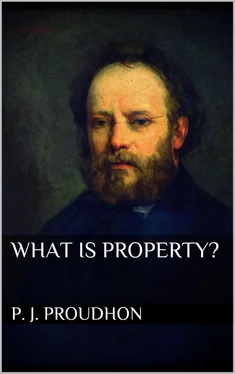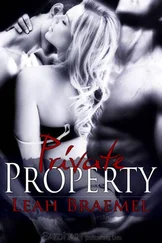But perhaps philosophy views things from too lofty a standpoint, and is not sufficiently practical; perhaps from the exalted summit of speculation men seem so small to the metaphysician that he cannot distinguish between them; perhaps, indeed, the equality of conditions is one of those principles which are very true and sublime as generalities, but which it would be ridiculous and even dangerous to attempt to rigorously apply to the customs of life and to social transactions. Undoubtedly, this is a case which calls for imitation of the wise reserve of moralists and jurists, who warn us against carrying things to extremes, and who advise us to suspect every definition; because there is not one, they say, which cannot be utterly destroyed by developing its disastrous results— Omnis definitio in jure civili periculosa est: parum est enim ut non subverti possit . Equality of conditions,—a terrible dogma in the ears of the proprietor, a consoling truth at the poor-man's sick-bed, a frightful reality under the knife of the anatomist,—equality of conditions, established in the political, civil, and industrial spheres, is only an alluring impossibility, an inviting bait, a satanic delusion.
It is never my intention to surprise my reader. I detest, as I do death, the man who employs subterfuge in his words and conduct. From the first page of this book, I have expressed myself so plainly and decidedly that all can see the tendency of my thought and hopes; and they will do me the justice to say, that it would be difficult to exhibit more frankness and more boldness at the same time. I do not hesitate to declare that the time is not far distant when this reserve, now so much admired in philosophers—this happy medium so strongly recommended by professors of moral and political science—will be regarded as the disgraceful feature of a science without principle, and as the seal of its reprobation. In legislation and morals, as well as in geometry, axioms are absolute, definitions are certain; and all the results of a principle are to be accepted, provided they are logically deduced. Deplorable pride! We know nothing of our nature, and we charge our blunders to it; and, in a fit of unaffected ignorance, cry out, "The truth is in doubt, the best definition defines nothing!" We shall know some time whether this distressing uncertainty of jurisprudence arises from the nature of its investigations, or from our prejudices; whether, to explain social phenomena, it is not enough to change our hypothesis, as did Copernicus when he reversed the system of Ptolemy.
But what will be said when I show, as I soon shall, that this same jurisprudence continually tries to base property upon equality? What reply can be made?
% 3.—Civil Law as the Foundation and Sanction of Property.
Pothier seems to think that property, like royalty, exists by divine right. He traces back its origin to God himself—ab Jove principium. He begins in this way:—
"God is the absolute ruler of the universe and all that it contains: Domini est terra et plenitudo ejus, orbis et universi qui habitant in eo . For the human race he has created the earth and all its creatures, and has given it a control over them subordinate only to his own. 'Thou madest him to have dominion over the works of thy hands; thou hast put all things under his feet,' says the Psalmist. God accompanied this gift with these words, addressed to our first parents after the creation: 'Be fruitful, and multiply and replenish the earth,'" &c.
After this magnificent introduction, who would refuse to believe the human race to be an immense family living in brotherly union, and under the protection of a venerable father? But, heavens! are brothers enemies? Are fathers unnatural, and children prodigal?
GOD GAVE THE EARTH TO THE HUMAN RACE: why then have I received none? HE HAS PUT ALL THINGS UNDER MY FEET,—and I have not where to lay my head! MULTIPLY, he tells us through his interpreter, Pothier. Ah, learned Pothier! that is as easy to do as to say; but you must give moss to the bird for its nest.
"The human race having multiplied, men divided among themselves the earth and most of the things upon it; that which fell to each, from that time exclusively belonged to him. That was the origin of the right of property."
Say, rather, the right of possession. Men lived in a state of communism; whether positive or negative it matters little. Then there was no property, not even private possession. The genesis and growth of possession gradually forcing people to labor for their support, they agreed either formally or tacitly,—it makes no difference which,—that the laborer should be sole proprietor of the fruit of his labor; that is, they simply declared the fact that thereafter none could live without working. It necessarily followed that, to obtain equality of products, there must be equality of labor; and that, to obtain equality of labor, there must be equality of facilities for labor. Whoever without labor got possession, by force or by strategy, of another's means of subsistence, destroyed equality, and placed himself above or outside of the law. Whoever monopolized the means of production on the ground of greater industry, also destroyed equality. Equality being then the expression of right, whoever violated it was UNJUST.
Thus, labor gives birth to private possession; the right in a thing—jus in re. But in what thing? Evidently IN THE PRODUCT, not IN THE SOIL. So the Arabs have always understood it; and so, according to Caesar and Tacitus, the Germans formerly held. "The Arabs," says M. de Sismondi, "who admit a man's property in the flocks which he has raised, do not refuse the crop to him who planted the seed; but they do not see why another, his equal, should not have a right to plant in his turn. The inequality which results from the pretended right of the first occupant seems to them to be based on no principle of justice; and when all the land falls into the hands of a certain number of inhabitants, there results a monopoly in their favor against the rest of the nation, to which they do not wish to submit."
Well, they have shared the land. I admit that therefrom results a more powerful organization of labor; and that this method of distribution, fixed and durable, is advantageous to production: but how could this division give to each a transferable right of property in a thing to which all had an inalienable right of possession? In the terms of jurisprudence, this metamorphosis from possessor to proprietor is legally impossible; it implies in the jurisdiction of the courts the union of possessoire and petitoire; and the mutual concessions of those who share the land are nothing less than traffic in natural rights. The original cultivators of the land, who were also the original makers of the law, were not as learned as our legislators, I admit; and had they been, they could not have done worse: they did not foresee the consequences of the transformation of the right of private possession into the right of absolute property. But why have not those, who in later times have established the distinction between jus in re and jus ad rem, applied it to the principle of property itself?
Let me call the attention of the writers on jurisprudence to their own maxims.
The right of property, provided it can have a cause, can have but one— Dominium non potest nisi ex una causa contingere . I can possess by several titles; I can become proprietor by only one— Non ut ex pluribus causis idem nobis deberi potest, ita ex pluribus causis idem potest nostrum esse . The field which I have cleared, which I cultivate, on which I have built my house, which supports myself, my family, and my livestock, I can possess: 1st. As the original occupant; 2d. As a laborer; 3d. By virtue of the social contract which assigns it to me as my share.
Читать дальше












